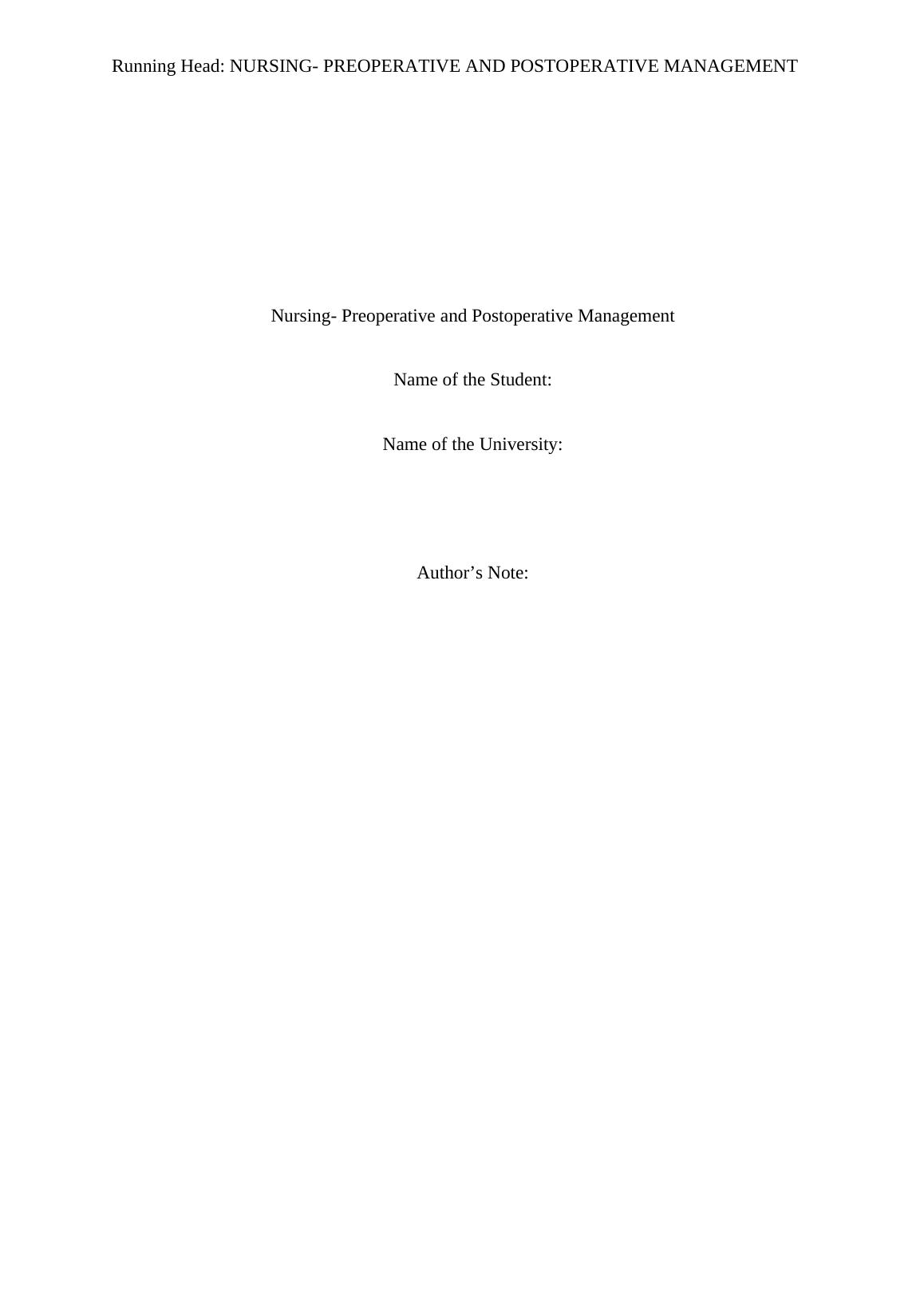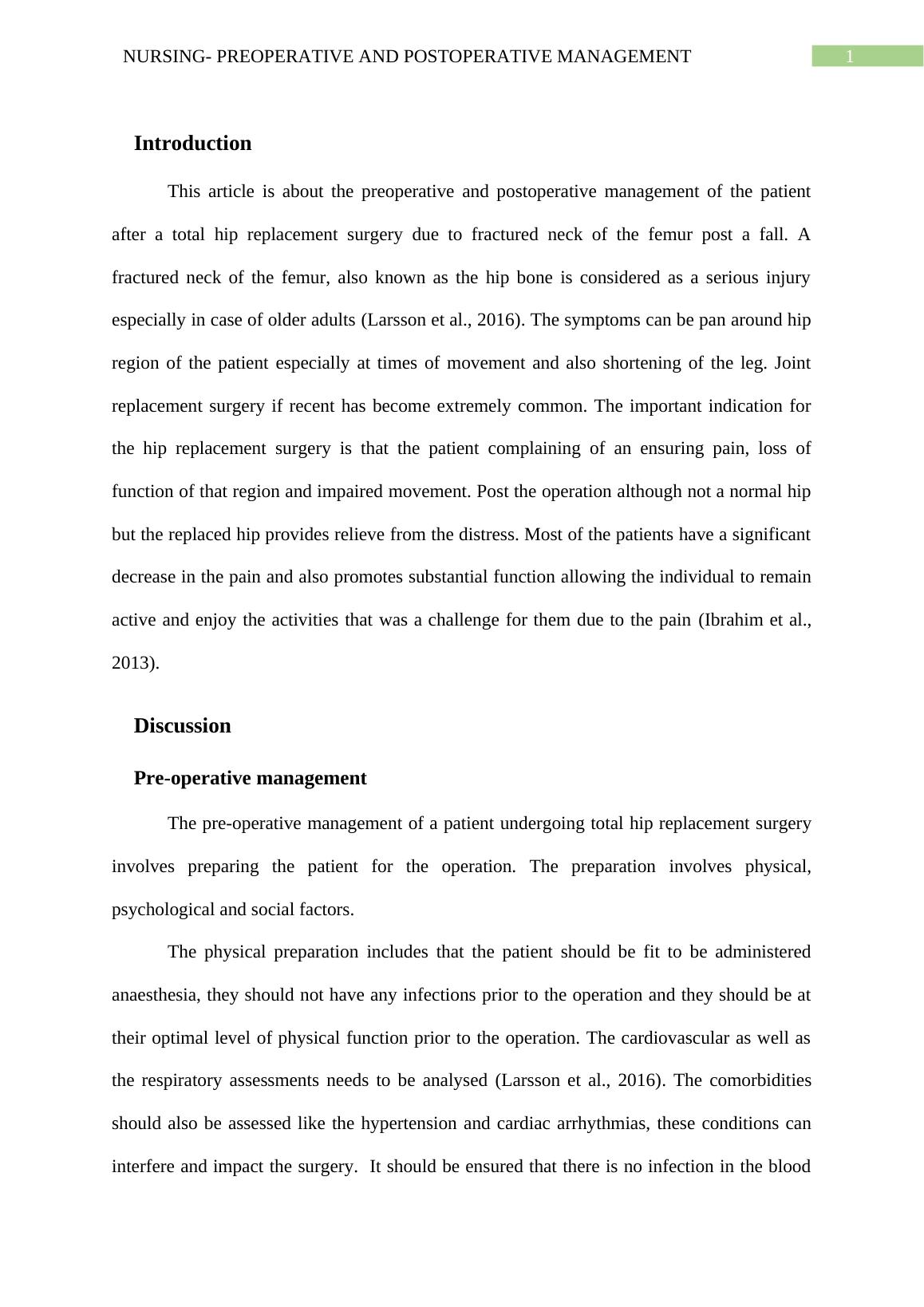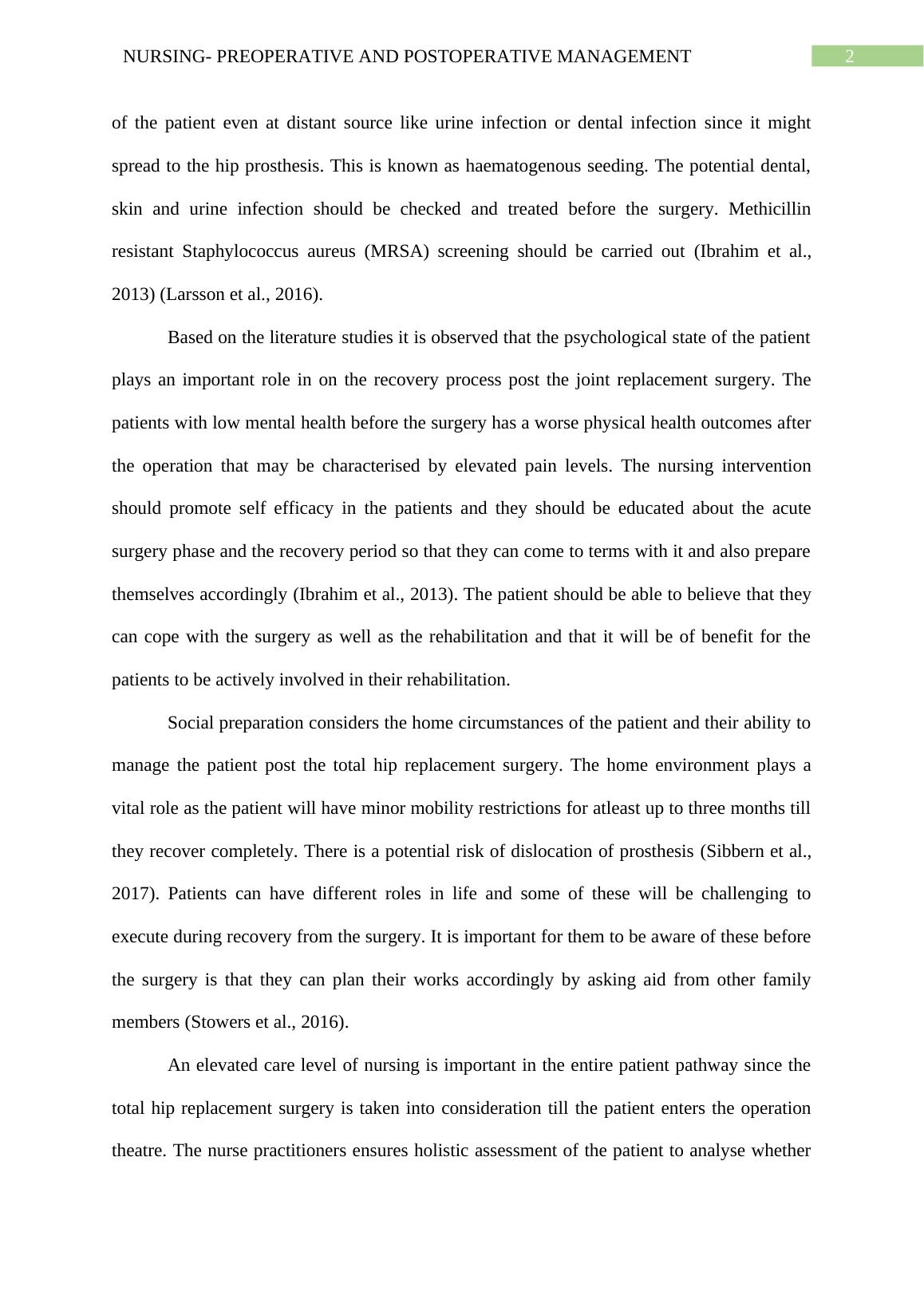Nursing- Preoperative and Postoperative Management Article 2022
Added on 2022-10-17
8 Pages2204 Words7 Views
Running Head: NURSING- PREOPERATIVE AND POSTOPERATIVE MANAGEMENT
Nursing- Preoperative and Postoperative Management
Name of the Student:
Name of the University:
Author’s Note:
Nursing- Preoperative and Postoperative Management
Name of the Student:
Name of the University:
Author’s Note:

NURSING- PREOPERATIVE AND POSTOPERATIVE MANAGEMENT1
Introduction
This article is about the preoperative and postoperative management of the patient
after a total hip replacement surgery due to fractured neck of the femur post a fall. A
fractured neck of the femur, also known as the hip bone is considered as a serious injury
especially in case of older adults (Larsson et al., 2016). The symptoms can be pan around hip
region of the patient especially at times of movement and also shortening of the leg. Joint
replacement surgery if recent has become extremely common. The important indication for
the hip replacement surgery is that the patient complaining of an ensuring pain, loss of
function of that region and impaired movement. Post the operation although not a normal hip
but the replaced hip provides relieve from the distress. Most of the patients have a significant
decrease in the pain and also promotes substantial function allowing the individual to remain
active and enjoy the activities that was a challenge for them due to the pain (Ibrahim et al.,
2013).
Discussion
Pre-operative management
The pre-operative management of a patient undergoing total hip replacement surgery
involves preparing the patient for the operation. The preparation involves physical,
psychological and social factors.
The physical preparation includes that the patient should be fit to be administered
anaesthesia, they should not have any infections prior to the operation and they should be at
their optimal level of physical function prior to the operation. The cardiovascular as well as
the respiratory assessments needs to be analysed (Larsson et al., 2016). The comorbidities
should also be assessed like the hypertension and cardiac arrhythmias, these conditions can
interfere and impact the surgery. It should be ensured that there is no infection in the blood
Introduction
This article is about the preoperative and postoperative management of the patient
after a total hip replacement surgery due to fractured neck of the femur post a fall. A
fractured neck of the femur, also known as the hip bone is considered as a serious injury
especially in case of older adults (Larsson et al., 2016). The symptoms can be pan around hip
region of the patient especially at times of movement and also shortening of the leg. Joint
replacement surgery if recent has become extremely common. The important indication for
the hip replacement surgery is that the patient complaining of an ensuring pain, loss of
function of that region and impaired movement. Post the operation although not a normal hip
but the replaced hip provides relieve from the distress. Most of the patients have a significant
decrease in the pain and also promotes substantial function allowing the individual to remain
active and enjoy the activities that was a challenge for them due to the pain (Ibrahim et al.,
2013).
Discussion
Pre-operative management
The pre-operative management of a patient undergoing total hip replacement surgery
involves preparing the patient for the operation. The preparation involves physical,
psychological and social factors.
The physical preparation includes that the patient should be fit to be administered
anaesthesia, they should not have any infections prior to the operation and they should be at
their optimal level of physical function prior to the operation. The cardiovascular as well as
the respiratory assessments needs to be analysed (Larsson et al., 2016). The comorbidities
should also be assessed like the hypertension and cardiac arrhythmias, these conditions can
interfere and impact the surgery. It should be ensured that there is no infection in the blood

NURSING- PREOPERATIVE AND POSTOPERATIVE MANAGEMENT2
of the patient even at distant source like urine infection or dental infection since it might
spread to the hip prosthesis. This is known as haematogenous seeding. The potential dental,
skin and urine infection should be checked and treated before the surgery. Methicillin
resistant Staphylococcus aureus (MRSA) screening should be carried out (Ibrahim et al.,
2013) (Larsson et al., 2016).
Based on the literature studies it is observed that the psychological state of the patient
plays an important role in on the recovery process post the joint replacement surgery. The
patients with low mental health before the surgery has a worse physical health outcomes after
the operation that may be characterised by elevated pain levels. The nursing intervention
should promote self efficacy in the patients and they should be educated about the acute
surgery phase and the recovery period so that they can come to terms with it and also prepare
themselves accordingly (Ibrahim et al., 2013). The patient should be able to believe that they
can cope with the surgery as well as the rehabilitation and that it will be of benefit for the
patients to be actively involved in their rehabilitation.
Social preparation considers the home circumstances of the patient and their ability to
manage the patient post the total hip replacement surgery. The home environment plays a
vital role as the patient will have minor mobility restrictions for atleast up to three months till
they recover completely. There is a potential risk of dislocation of prosthesis (Sibbern et al.,
2017). Patients can have different roles in life and some of these will be challenging to
execute during recovery from the surgery. It is important for them to be aware of these before
the surgery is that they can plan their works accordingly by asking aid from other family
members (Stowers et al., 2016).
An elevated care level of nursing is important in the entire patient pathway since the
total hip replacement surgery is taken into consideration till the patient enters the operation
theatre. The nurse practitioners ensures holistic assessment of the patient to analyse whether
of the patient even at distant source like urine infection or dental infection since it might
spread to the hip prosthesis. This is known as haematogenous seeding. The potential dental,
skin and urine infection should be checked and treated before the surgery. Methicillin
resistant Staphylococcus aureus (MRSA) screening should be carried out (Ibrahim et al.,
2013) (Larsson et al., 2016).
Based on the literature studies it is observed that the psychological state of the patient
plays an important role in on the recovery process post the joint replacement surgery. The
patients with low mental health before the surgery has a worse physical health outcomes after
the operation that may be characterised by elevated pain levels. The nursing intervention
should promote self efficacy in the patients and they should be educated about the acute
surgery phase and the recovery period so that they can come to terms with it and also prepare
themselves accordingly (Ibrahim et al., 2013). The patient should be able to believe that they
can cope with the surgery as well as the rehabilitation and that it will be of benefit for the
patients to be actively involved in their rehabilitation.
Social preparation considers the home circumstances of the patient and their ability to
manage the patient post the total hip replacement surgery. The home environment plays a
vital role as the patient will have minor mobility restrictions for atleast up to three months till
they recover completely. There is a potential risk of dislocation of prosthesis (Sibbern et al.,
2017). Patients can have different roles in life and some of these will be challenging to
execute during recovery from the surgery. It is important for them to be aware of these before
the surgery is that they can plan their works accordingly by asking aid from other family
members (Stowers et al., 2016).
An elevated care level of nursing is important in the entire patient pathway since the
total hip replacement surgery is taken into consideration till the patient enters the operation
theatre. The nurse practitioners ensures holistic assessment of the patient to analyse whether

End of preview
Want to access all the pages? Upload your documents or become a member.
Related Documents
Nursing Care During Total Hip Replacementlg...
|8
|2384
|44
Hip Replacement for NOFlg...
|9
|2302
|92
Gerontological Aged Care Rehabilitation Nursing for Elderly Patients with Hip Replacement Surgerylg...
|13
|3843
|396
Acute Care Nursing: Assignmentlg...
|9
|2541
|32
Nursing the Surgical Patient Essay 2022lg...
|10
|2934
|37
Roles and Responsibilities of Scrub Nurse and Circulating Nurse in Operating Roomlg...
|10
|2632
|140
